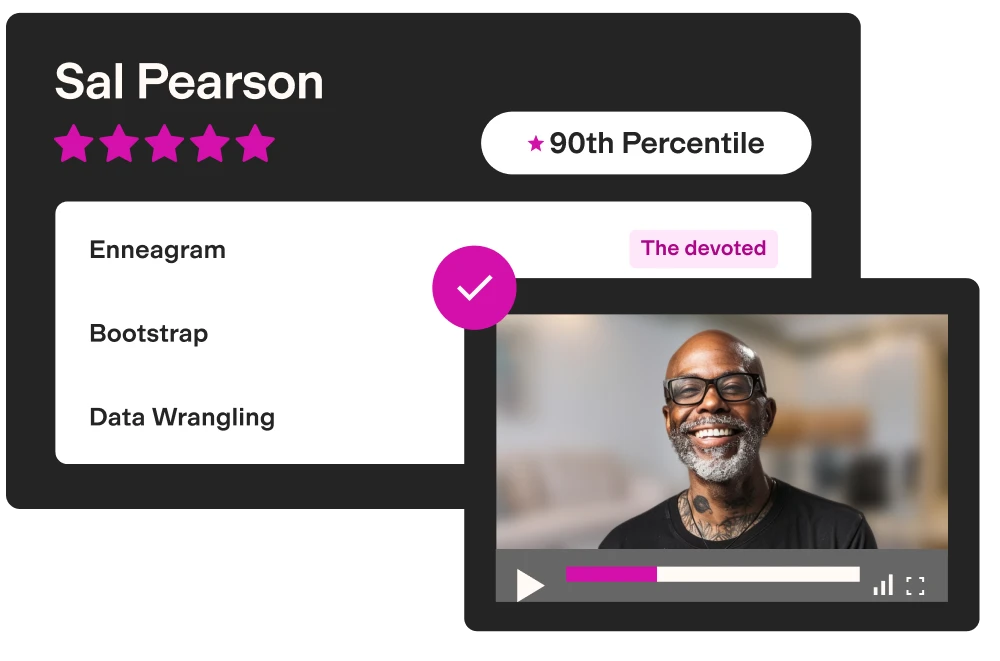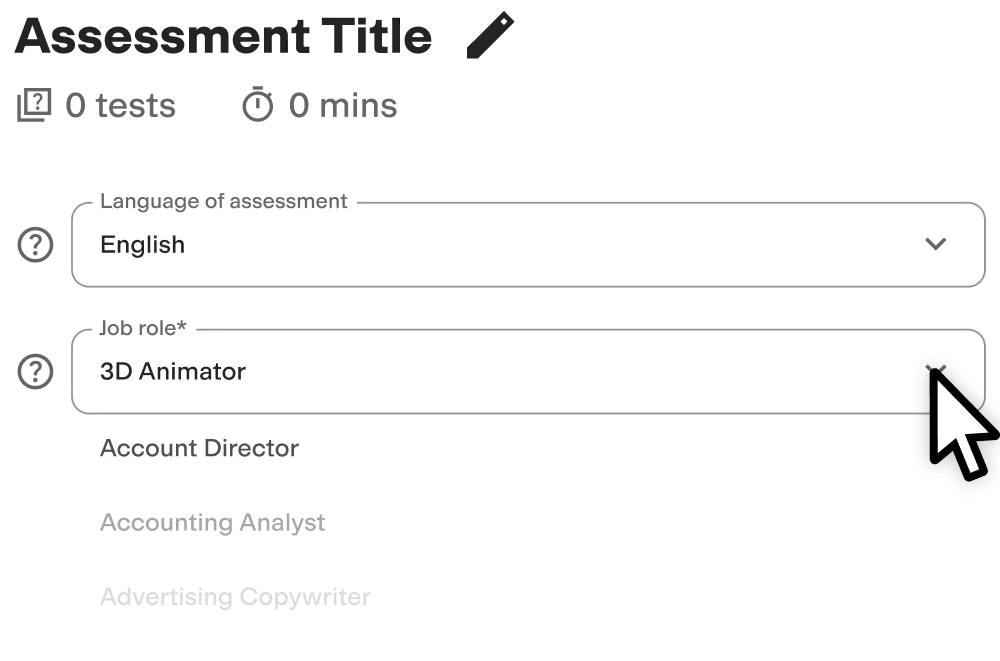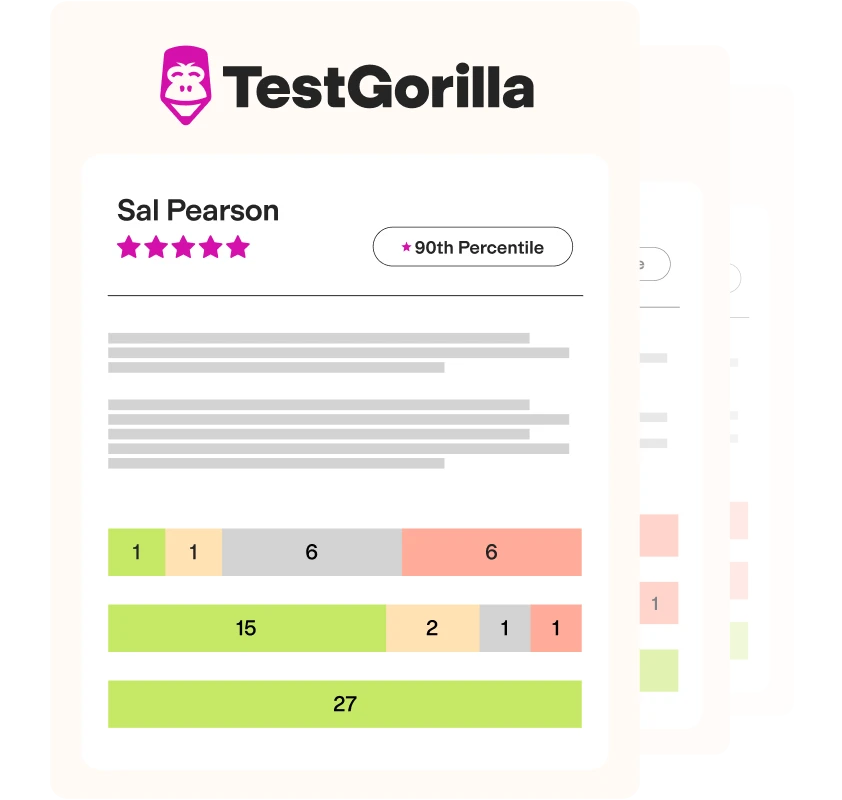Culture Add test
Summary of the Culture Add test
This Culture Add test is a crucial part of the hiring process that assesses how a candidate’s values and behaviors align with your organization's values. Based on your answers to a customized survey, this culture test identifies applicants who align with your company’s core values while also bringing in new perspectives and skills to add to your culture.
Use the Culture Add test to hire
All job roles. Whether you’re a rising startup or an enterprise-level organization, developing and maintaining a strong culture provides one of the greatest competitive advantages you can have on the market. This Culture Add test helps you map the way to a healthier, more productive culture.
About the Culture Add test
All successful companies have one thing in common: a strong culture. Workplace culture is not about the fancy office, the ping-pong table, or the colorful co-creation rooms.
A strong organizational culture means a company's leaders and employees share the same business values. These values guide leaders’ and team members’ approaches to:
Collaboration
Problem-solving
Responding to pressure
Rewarding successes
Traditional cultural fit assessments focus on finding candidates who match the superficial characteristics of your existing culture without looking at these deeper values. For example, old-fashioned cultural fit hiring decisions might uplift applicants who replicate the same skills and personality traits of your existing team. This can lead to groupthink and stagnate innovation.
By contrast, our Culture Add test helps you identify the best candidates whose drive and aspirations align with your organization’s values and needs but who also bring new skill sets, diverse perspectives, and innovative working styles to add to your company culture.
Simply fill out our custom survey by:
Rating a list of values according to their importance in your workplace culture
Indicating the behaviors (such as analytical, diligent, helpful, etc.) that are important for your open role
Our Culture Add test then asks applicants to select the values and behaviors that matter most to them, and we map these results to your specifications. The results show you how each candidate aligns with your company values to help you find the perfect hire.
The test is made by a subject-matter expert
TestGorilla’s tests are created by subject matter experts. We assess potential subject-matter experts based on their knowledge, ability, and reputation.Before being published, each test is peer-reviewed by another expert, then calibrated using hundreds of test takers with relevant experience in the subject.
Our feedback mechanisms and unique algorithms allow our subject-matter experts to constantly improve their tests.
Otto V.
Otto worked at Bain & Company for 13 years and served as a Partner in Bain's Amsterdam office. He specializes in customer strategy and marketing, growth strategies, and change management. He supported mainly retail banks, telecom companies, and agrifood businesses.
Otto has been involved in recruiting throughout his career and led Bain's Associate Recruiting department for a number of years. He is one of TestGorilla's co-founders, focusing on test development, product, and technology.
Use TestGorilla to hire the best faster, easier and bias-free
Our screening tests identify the best candidates and make your hiring decisions faster, easier, and bias-free.
Create high-quality assessments, fast
Building assessments is a breeze with TestGorilla. Get started with these simple steps.
What is the Culture Add test?
Our Culture Add test is a multiple-choice pre-interview assessment designed to help you hire for culture in an objective, measurable, and repeatable way.
It assesses how well your candidate’s underlying values align with the ethos of your business based on your answers to a quick survey about:
The values that apply across your organization
The behaviors you’re looking for in the role
Here’s how it works:
How does the Culture Add test work?
When completing the survey, you’re asked to rate a range of values based on how important they are to your organization as a whole. These include values like:
Achievement
Equality
Independence
These apply to your whole company and, therefore, can be kept the same when hiring for any role.
Remember: Only give a top rating to values that set you apart from competitors. That way, the candidates that align with your most important values are more likely to stand out.
Next, repeat the process, but this time for the behaviors most important to success in the specific role you’re hiring for. Examples include:
Diligent
Helpful
When candidates take the Culture Add test, they are asked to rate the values most important to them and the behaviors they exhibit, choosing from a list that includes your selection. Their results show how well their values map onto your priorities and where they deviate.
Why is a Cultural Add test important to employers?
A strong culture can boost engagement, retention, adaptability, and innovation by creating a supportive environment where employees and leaders are motivated to reach common goals.
On the contrary, companies with weak and stagnant cultures experience:
Rifts between leadership and employees
A high turnover rate as a result of employee unhappiness
Sinking profits
Adding a Culture Add test to your recruitment process can help you create diverse teams and a strong culture by limiting the effects of unconscious bias on your assessment of candidates’ values.
This prevents you from creating a homogeneous workforce filled with new hires who think similarly, which often leads to a status quo with stifled problem-solving, creativity, and innovation.
Why should you pick culture add over culture fit?
A cultural add test is better at creating a strong company culture than a cultural fit assessment because cultural fit tests generally focus on more superficial characteristics.
Take the classic “beer test,” where an interviewer decides if they would get a beer with a candidate. This is a common cultural fit test, but it backfires because it is:
Subjective, being based on one person’s opinion
Superficial, relying on the individual’s perceived personality traits
Biased, leading hiring managers to gravitate toward similar demographics
Irrelevant to the deeper motivations underlying the work at hand
By contrast, a culture add hiring strategy identifies applicants who share your company’s deeper motivations while also bringing new competencies, approaches, and life experiences to the table.
Our Culture Add test is especially powerful when used in conjunction with other skills-based hiring and personality tests.
With this insight in hand after the screening stage, you can then use interviews to probe further into applicants’ motivations and ethos during the interview process with culture add interview questions.
What job roles can you hire with our Culture Add assessment?
Every company has its own culture that impacts every role within it. Therefore, you can use our Culture Add test to hire high-performing candidates in any company and department.
Here are some examples of the wide-ranging roles this cultural add assessment can be used to recruit for:
Chief operating officers and other C-suite staff need to be able to grow your organizational culture because their role guides the company as it grows
Call center representatives need to align well with your culture so that they can perform well as the face – or voice – of your business to customers
Warehouse supervisors frequently need to problem-solve and collaborate with others; doing this in a way that advances your organizational culture is essential
Human resources managers are the internal representatives for your company culture – if they don’t promote your values, this could sow division and confusion among your other employees
How to combine a Culture Values test with skills-based hiring
A Culture Add test fits in nicely alongside any number of skills tests. For the best results in talent acquisition, make sure that you also use tests that validate skills and assess a range of factors, including:
Hard skills: technical abilities that are essential to functioning in the target role
Soft skills: interpersonal skills that help candidates direct their work and collaborate with others
Personality traits: how they align with different models of behavior that can help you understand their potential fit with their team
This ensures your hiring team gets a holistic, data-driven picture of each candidate and their strengths and weaknesses compared with others.
Create a multi-measure assessment: 4 tests to pair with the Culture Add test
Here are four assessments you can use alongside the Culture Add test to hire the best talent for your open roles:
The English C1 (Advanced) test ensures language barriers don’t get in the way of your company culture by measuring applicants’ English fluency
The Numerical Reasoning test assesses how well candidates process numerical information and basic math concepts
The Business Judgment test evaluates individuals’ decision-making abilities in a business context – for example, whether they know how to approach strategic decision-making
The Big Five (OCEAN) test examines candidates’ expression of five different personality traits: openness, conscientiousness, extroversion, agreeableness, and neuroticism
Note: We haven’t included any role-specific skills tests here because they depend on the position you’re hiring for. However, we highly recommend you add at least one in your five-test assessment to ensure your candidates possess the right skills for the job.
FAQs
View a sample report
The Culture Add test will be included in a PDF report along with the other tests from your assessment. You can easily download and share this report with colleagues and candidates.







